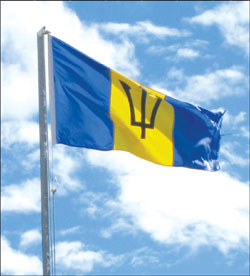Barbados on the move
"Which other little nation in the world in the course of the next 18 months will be in a position to be the stage for two World Cup events? Barbados is now more ready than ever to show itself capable of dealing with all of the small things that make the lives of the ordinary man and woman worth living. But we are equally capable of showing that we are now more ready than ever to display world-class standards when performing on a global stage."
 These were the words of Barbadian Prime Minister and Minister of Finance Owen Arthur as he presented the government's budget for 2006, a year that would see the small Eastern Caribbean island state celebrate its 40th year of independence and host the World Golf Championship World Cup, leading up to an even bigger event, the 2007 Cricket World Cup final in the nation's capital Bridgetown in April.
These were the words of Barbadian Prime Minister and Minister of Finance Owen Arthur as he presented the government's budget for 2006, a year that would see the small Eastern Caribbean island state celebrate its 40th year of independence and host the World Golf Championship World Cup, leading up to an even bigger event, the 2007 Cricket World Cup final in the nation's capital Bridgetown in April.
Few would disagree that Barbados is currently at an important juncture in its history. Barbados has taken the lead in implementing the Caribbean Community (CARICOM) Single Market and Economy (CSME), an effort already believed to have generated a 30 percent increase in Barbados' exports to other CARICOM countries.
At the same time, the government has launched a comprehensive strategic framework for the country's development over the next 20 years with the slogan, "Global Excellence, Barbadian Traditions."
The plan prescribes a series of initiatives across the economy to enhance the nation's global competitiveness and make the island even more attractive as a place to do business.
Looking back at the country's first four decades of independence, Barbadian Deputy Prime Minister and Minister of Economic Affairs and Development Mia Mottley explains, "We have had to restructure our economy over the course of the 40 years."
"Forty years ago, Barbados relied predominantly on sugar. Today, the economy has changed substantially and over the course of the 40 years you have seen the birth of an industrial sector, you have seen the creation of an international business and financial services sector, and you have seen the considerable expansion of the tourism sector."
Mia Mottley, Deputy Prime Minister and Minister of Economic Affairs and Development of Barbados |
Today, Barbados has become known as the success story of the Caribbean, with the highest standard of living in the region and steady economic growth projected at 3.5 to 4.0 percent in real terms for 2006.
Yet, Mottley cautions, "We have to make choices that continue to put people first and at the center of our decision-making process rather than simply seeking to get growth for the sake of growth and therefore creating a destabilizing environment in terms of social cohesion."
While Barbados is known for its famous brands of rum and its pioneering solar water heater manufacturers, it is indeed its well-educated and English-speaking population that is regarded as the country's main asset.
Barbados' focus on education has served the country well, as evidenced by a literacy rate of 99 percent, among the highest in the world.
Now, an even greater emphasis is being placed on developing the skills base of the island in parallel with the rapid expansion of the country's information and communication technology (ICT) infrastructure.
Political stability, a pleasant climate, the rule of law, minimal corruption and crime, a highly skilled workforce, and a well-developed infrastructure are but some of the reasons why international investors are now flocking to the island.
Furthermore, attractive incentives packages and the country's network of double taxation treaties with several countries, including China, are key to understanding how Barbados has managed to create a significant international business and financial services sector.
Looking ahead, Barbados is keen to strengthen its relations with Middle Eastern and Asian countries.
As Barbados in 2005 was granted approved tourist destination status by China, Chinese travellers are now encouraged to visit the island to see for themselves what the country has to offer.
Mottley explains, "Barbados established diplomatic relations with China very early from as far back as the mid 1970s, and we believe that our relationship with China is a mature relationship, it is one that we value considerably, and we have tried in recent years to allow that relationship to flourish by signing a double taxation agreement and a bilateral investment treaty with China, recognizing that there are opportunities, not just for investment in each other's countries, but largely because Barbados is not a tax haven but in fact a low tax jurisdiction that operates on a network of treaties and has become a domicile for onward investment into other countries across the globe."
(Shanghai Start 02/01/2007 page1)















